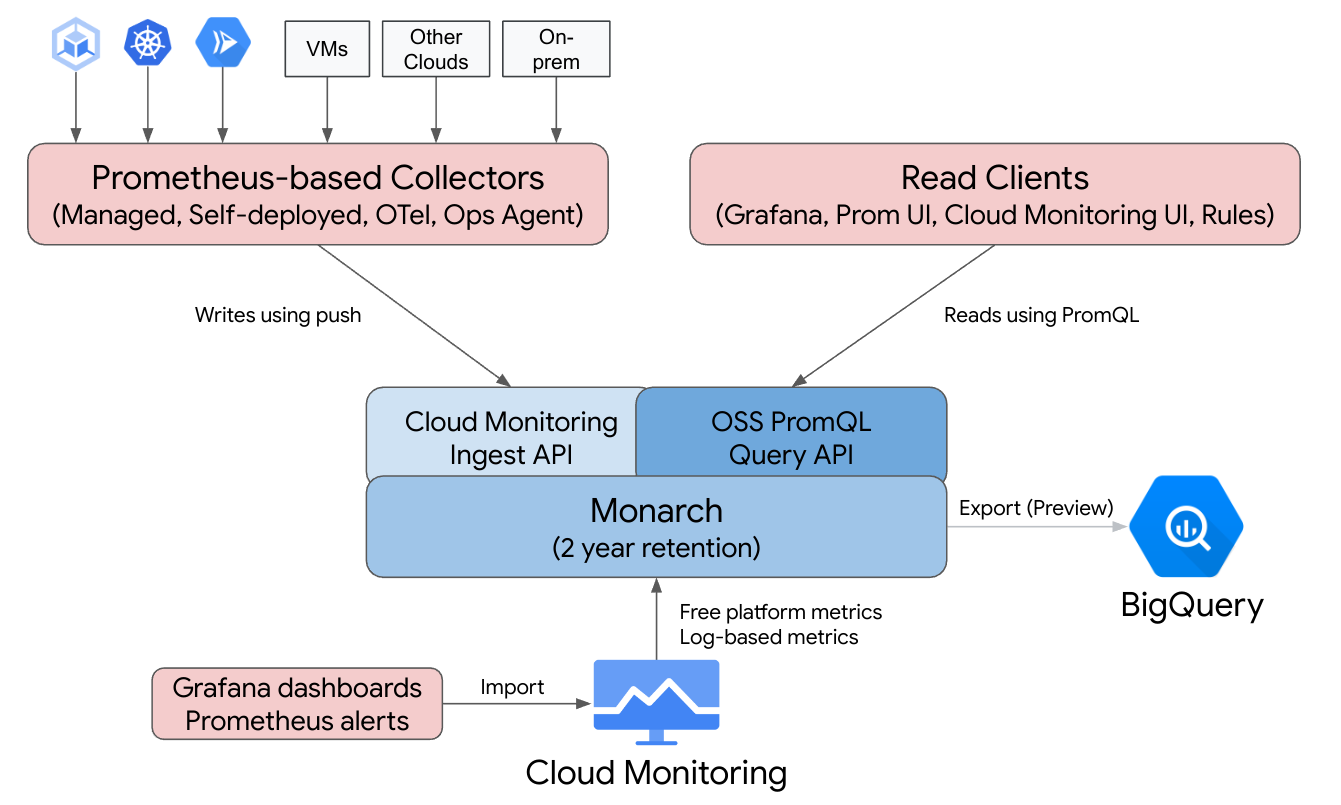이 문서에서는 Google Cloud Managed Service for Prometheus에서 사용할Google Cloud 프로젝트의 측정항목 범위를 구성하는 방법을 설명합니다.
이상적인 Managed Service for Prometheus 배포는 필요에 따라 일반적인 Prometheus 배포와 다릅니다. Prometheus 범위는 데이터를 수집하는 자체 Prometheus 서버에서 실행되는 규칙과 쿼리에서 자체 인스턴스(일반적으로 클러스터 범위)로 지정됩니다. Managed Service for Prometheus는 데이터를 전역 백엔드인 Monarch로 전송하므로 쿼리가 로컬 클러스터가 아닌 Monarch에 대해 실행되도록 구성해야 합니다. 관리형 컬렉션을 사용하는 경우 같은 요구사항이 규칙에 적용됩니다.

Managed Service for Prometheus를 사용하여 쿼리하는 데이터는 데이터 쿼리 방식에 관계없이 Cloud Monitoring 구문 측정항목 범위에 따라 결정됩니다.
측정항목 범위
Monitoring 측정항목 범위는 여러 Google Cloud 프로젝트에 속하는 측정항목 데이터를 쿼리할 수 있게 해주는 읽기 전용 구문입니다. 모든 측정항목 범위는 범위 지정 프로젝트라고 부르는 지정된 Google Cloud 프로젝트에서 호스팅됩니다.
기본적으로 프로젝트는 자체 측정항목 범위에 대한 범위 지정 프로젝트이고, 측정항목 범위에는 해당 프로젝트에 대한 측정항목 및 구성이 포함되어 있습니다. 범위 지정 프로젝트는 측정항목 범위에 모니터링 프로젝트를 두 개 이상 가질 수 있으며 측정항목 범위에 있는 모든 모니터링 프로젝트의 측정항목과 구성은 범위 지정 프로젝트에 표시됩니다. 또한 모니터링 프로젝트는 측정항목 범위 두 개 이상에 포함될 수 있습니다.
범위 지정 프로젝트에서 측정항목을 쿼리하고 해당 범위 지정 프로젝트가 멀티 프로젝트 측정항목 범위를 호스팅하는 여러 프로젝트에서 데이터를 검색할 수 있습니다. 측정항목 범위에 모든 프로젝트가 포함되면 쿼리와 규칙이 전역적으로 평가됩니다.
범위 지정 프로젝트 및 측정항목 범위에 대한 자세한 내용은 측정항목 범위를 참조하세요. 다중 프로젝트 측정항목 범위 구성에 대한 자세한 내용은 다중 프로젝트의 측정항목 보기를 참조하세요.
권한 모델 복잡성을 최소화하려면 측정항목 범위를 가능한 적게 사용합니다. 측정항목 데이터가 민감하다고 간주되지 않고 모든 사용자가 모든 측정항목에 액세스할 수 있도록 허용하려면 모든 프로젝트가 포함된 단일 측정항목 범위를 사용합니다.
쿼리할 수 있도록 프로젝트 그룹화
다른 권장사항 시나리오에서는 다음과 같은 측정항목 범위 구성을 사용합니다.
| 범위 A | 범위 B | 범위 C | |
|---|---|---|---|
| 범위 지정 프로젝트 | scoping-project-A | scoping-project-B | scoping-project-C |
| 모니터링 프로젝트 | 프로젝트 1 프로젝트 2 |
프로젝트 3 프로젝트 4 |
프로젝트 1 프로젝트 2 프로젝트 3 프로젝트 4 프로젝트 5 |
| IAM 권한이 부여된 그룹 (예시) |
개발팀 A | 개발팀 B | SRE팀 |
